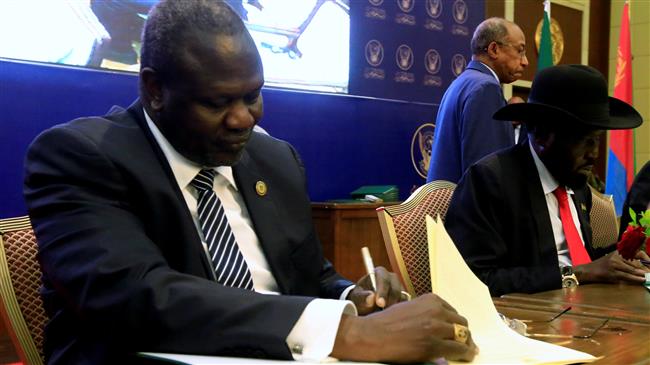South Sudan’s Machar backs out of peace deal draft
South Sudan’s rebel leader Riek Machar has refused to sign the latest draft of a peace deal with the government of President Salva Kiir that could end nearly five years of civil war in the youngest country of the world.
Sudan’s Foreign Minister Al-Dierdiry Ahmed, who is mediating talks between the two sides of the conflict in South Sudan, told reporters in the Sudanese capital, Khartoum, on Tuesday that the rebel leader, along with other main opposition groups, would not sign the final deal even as Juba inked it.
“The main South Sudanese opposition groups, including the SPLM-IO (Machar faction), refused to sign the final document demanding that their reservations be guaranteed in it,” Ahmed said, showing the draft text to diplomats who had gathered for what was expected to be a preliminary signing ceremony in Khartoum.
“This is the final document which had been arrived at after consultations between all South Sudanese parties,” Ahmed said. “South Sudan will not have peace unless these groups sign.”
“For the first time, the opposition told us that it will not sign,” the Sudanese diplomat said.
The warring parties have held weeks of talks in Khartoum in search of a comprehensive peace agreement to end the conflict, which has killed thousands of people and displaced millions.
Officials said rebel groups had differences over the functioning of a proposed transitional government as well as the number of states the country should be divided into, and a new constitution.
Machar and President Kiir signed a ceasefire and power-sharing agreement earlier this month. But Machar’s refusal to sign the latest draft could be a sign of hardships facing the implementation of a full agreement.

Previous peace deals have held for only a matter of months before fighting resumed. Kiir has blamed the collapse of previous peace agreements on foreign influence.
South Sudan’s civil war erupted in December 2013, less than two years after the country gained independence from Sudan. The war has uprooted a quarter of South Sudan’s population of 12 million.
Source: Presstv





